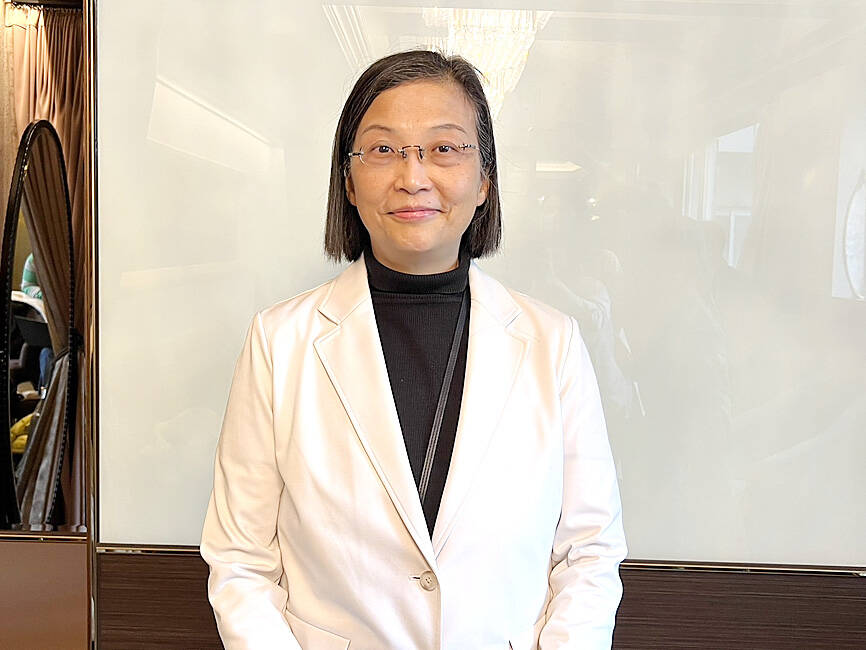GlobalWafers Co (環球晶圓), the world’s third-largest silicon wafer supplier, yesterday said that the financial turmoil in the US and Europe has dimmed the outlook for chip demand in the second half of this year, as growing economic uncertainty could dampen consumer spending.
The Hsinchu-based wafer manufacturer said it is seeing greater pressure from economic uncertainty on the industry’s recovery, as customers would have not expected Silicon Valley Bank, Signature Bank and a tier-one bank like Credit Suisse Group SA to collapse suddenly.
Although the failures are unlikely to cause systemic risks, consumers would be cautious of spending on non-essential items, such as electronics, GlobalWafers said.

Photo: Grace Hung, Taipei Times
“We previously expected that the third quarter would be a better period. However, some customers have turned more conservative due to the spate of financial turmoil. Before that, they were more proactive” about placing orders,” GlobalWafers chairwoman Doris Hsu (徐秀蘭) said on the sidelines of an investors’ conference in Taipei.
Two months ago, GlobalWafers told investors that chip demand would pick up at a marked pace during the second half, as customers’ inventory corrections were expected to bottom out at the end of the second quarter, paving the way for a rebound in end-product demand from the third and fourth quarters.
“We are not saying that market demand will sour in the second half,” Hsu said. “Overall market sentiment turned conservative. At the same time, we also see signs of a positive direction.”
The company signed two new long-term supply agreements in the first quarter, normally a low season, Hsu said.
That indicates some customers remain bullish about chip demand in the long run, she said.
Infineon Technology AG, one of its long-term customers, this week issued a robust business outlook for this year, Hsu said.
Infineon did not ask for a delay in wafer shipments like other customers, given solid demand for power chips, she said.
Texas Instruments Inc also said it might rebuild inventory, as its stocks have dropped to a low level, Hsu said.
Another encouraging sign is that some customers have asked to reduce the number of wafers whose shipments had been delayed, Hsu said.
In addition to strong demand for chips used in autos and industrial devices, GlobalWafers has seen a recovery in demand from display drive IC makers, while demand from memorychip makers remains fragile, she said.
The company’s 8-inch and 12-inch wafer plants continue to operate at a higher utilization rate of at least 95 percent, the company said.
Regarding GlobalWafers’ new 12-inch fab in Texas, Hsu said construction has been proceeding as planned.
The US plant is expected to ramp up production at the beginning of 2025.
Asked if GlobalWafers believes the US’ request to share profits of subsidy applicants based on the Creating Helpful Incentives to Produce Semiconductors (CHIPS) and Science Act is “excessive,” Hsu said the company is categorized as a material company, rather than a foundry company, so the requirements could vary.
The company is closely monitoring when the US would release details about subsidy applications for “Phase 2” companies, she said.

TRADE WAR: Tariffs should also apply to any goods that pass through the new Beijing-funded port in Chancay, Peru, an adviser to US president-elect Donald Trump said A veteran adviser to US president-elect Donald Trump is proposing that the 60 percent tariffs that Trump vowed to impose on Chinese goods also apply to goods from any country that pass through a new port that Beijing has built in Peru. The duties should apply to goods from China or countries in South America that pass through the new deep-water port Chancay, a town 60km north of Lima, said Mauricio Claver-Carone, an adviser to the Trump transition team who served as senior director for the western hemisphere on the White House National Security Council in his first administration. “Any product going

TECH SECURITY: The deal assures that ‘some of the most sought-after technology on the planet’ returns to the US, US Secretary of Commerce Gina Raimondo said The administration of US President Joe Biden finalized its CHIPS Act incentive awards for Taiwan Semiconductor Manufacturing Co (TSMC, 台積電), marking a major milestone for a program meant to bring semiconductor production back to US soil. TSMC would get US$6.6 billion in grants as part of the contract, the US Department of Commerce said in a statement yesterday. Though the amount was disclosed earlier this year as part of a preliminary agreement, the deal is now legally binding — making it the first major CHIPS Act award to reach this stage. The chipmaker, which is also taking up to US$5 billion

High above the sparkling surface of the Athens coastline, the cranes for building the 50-floor luxury tower centerpiece of Greece’s future “smart city” look out over the Saronic Gulf. At their feet, construction machinery stirs up dust. Its backers say the 8 billion euro (US$8.43 billion) project financed by private funds is a symbol of Greece’s renaissance after the years of financial stagnation that saw investors flee the country. However, critics see it more as a future “ghetto for the rich.” It is hard to imagine that 10km from the Acropolis, a new city “three times the size of Monaco”

STRUGGLING BUSINESS: South Korea’s biggest company and semiconductor manufacturer’s buyback fuels concerns that it could be missing out on the AI boom Samsung Electronics Co plans to buy back about 10 trillion won (US$7.2 billion) of its own stock over the next year, putting in motion one of the larger shareholder return programs in its history. South Korea’s biggest company would repurchase the stock in stages over the coming 12 months, it said in a regulatory filing on Friday. As a first step, it would buy back about 3 trillion won of paper starting today up until February next year, all of which it would cancel. The board would deliberate on how best to effect the remaining 7 trillion won of buybacks. The move